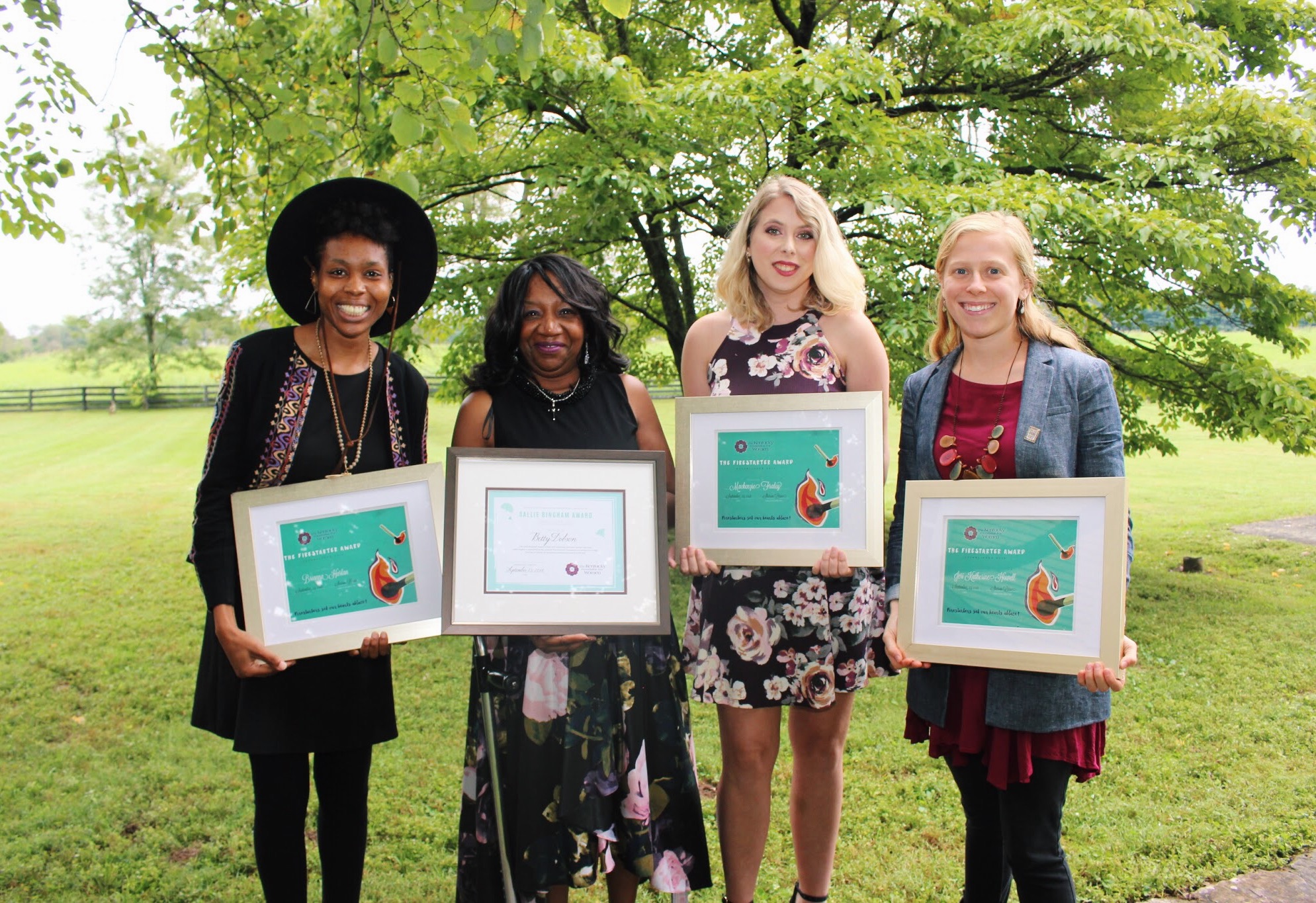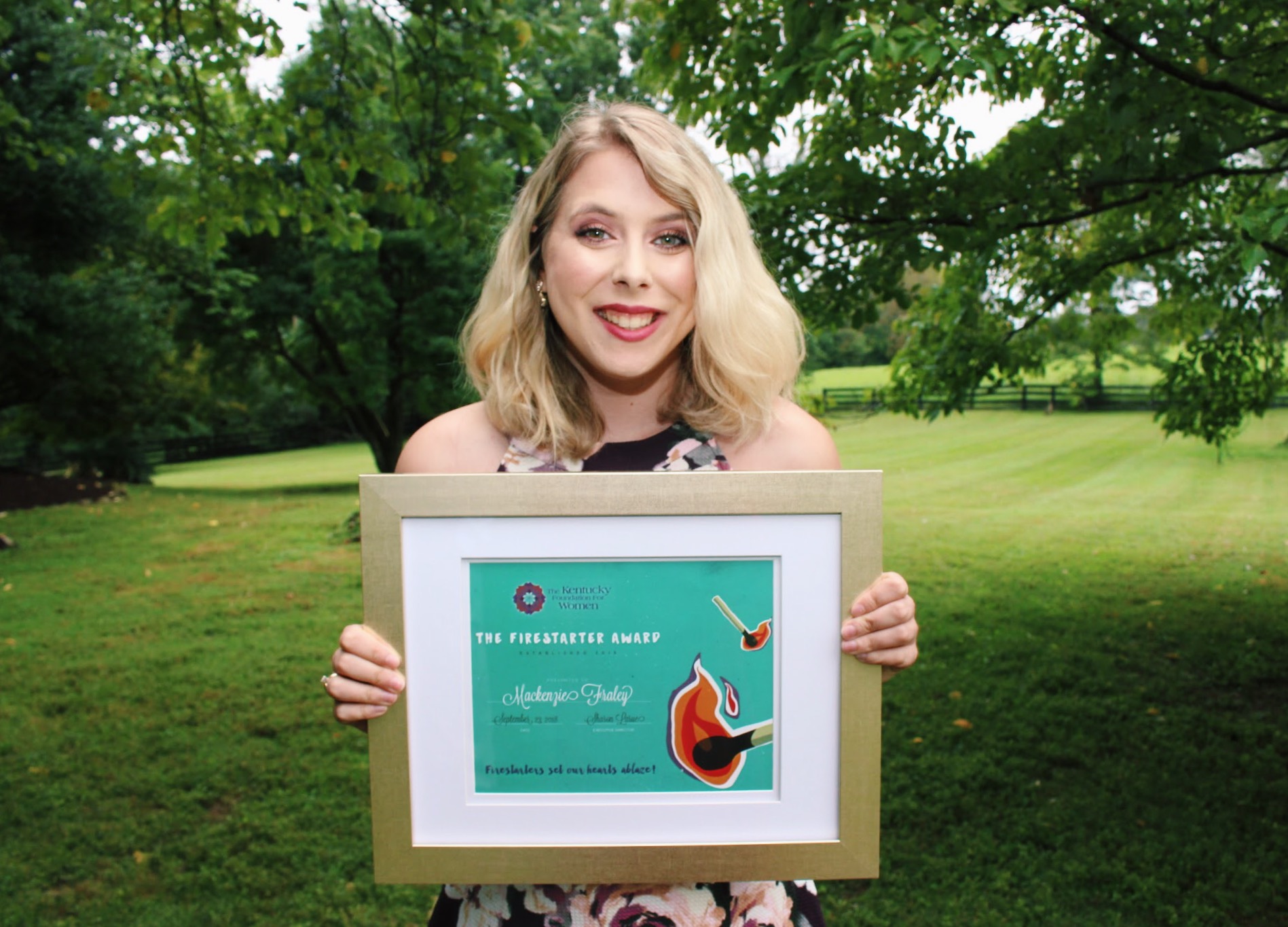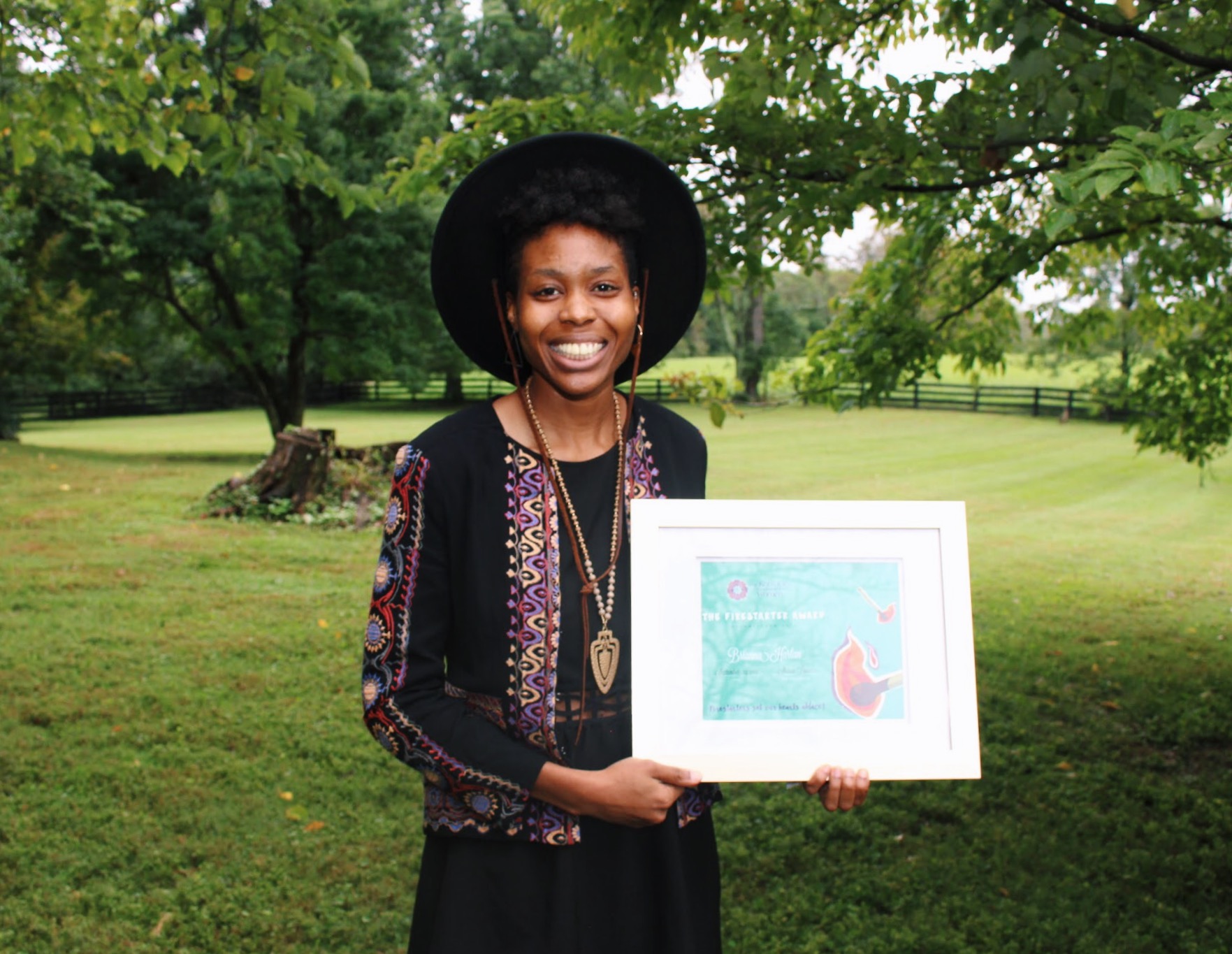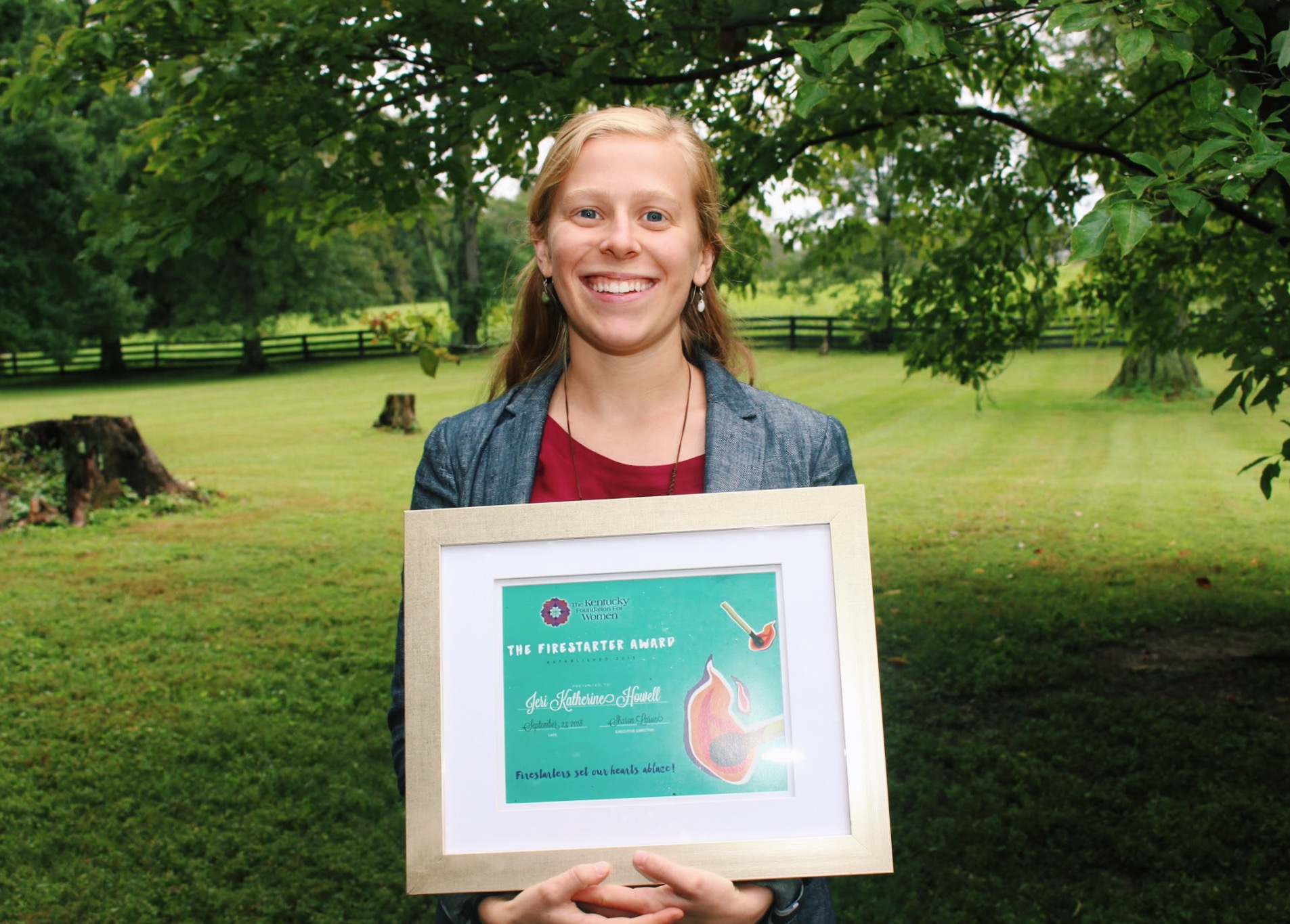Young Feminists Blazing New Trails: An In-Depth Look at KFW’s 2018 Firestarters
Young Feminists Blazing New Trails: An In-Depth Look at KFW’s 2018 Firestarters

(Firestarters Brianna, Mackenzie, and Jeri pictured with 2018 Sallie Bingham Award Winner Betty Dobson)
Kentucky Foundation for Women is pleased to celebrate four remarkable young feminist artists as our 2018 Firestarters. Mackenzie Fraley, 20, Bri Harlan, 25, Jeri Katherine Howell, 24 and Lacey Trautwein, 22, are the recipients of KFW’s fourth Firestarter Award. The award was given at the foundation’s annual celebration of community, KFW Day, on Sunday, September 23th at Hopscotch House.
The Firestarter Award honors young people who show meaningful promise in developing as feminist, social change artists, whose work has the potential to create change for women and girls in Kentucky.
Here is a closer look at the accomplishments and insights of these amazing young artists:
Mackenzie Fraley, 20, Inez

Mackenzie is a Theatre minor at the University of Pikeville. In her work with the theatre (Both at UPIKE and at Jenny Wiley Theatre), Mackenzie has sought roles that focus on female empowerment. Inspired by a class project about Appalachian Murder Ballads, Mackenzie researched the historical facts of a popular murder ballad and wrote and performed an original stage script about Lula Viers, a woman only remembered for her murder. After the course was completed, Mackenzie continued researching the women named in these ballads and has spoken at the Elkhorn City Historical Society and other venues to bring stories of tragic and forgotten women’s history to light.
When did you first realize that you are a feminist artist?
I was working on a monologue of a character who was so broken and unsure of herself, but yet knew she needed to pull herself together because she had two sons. She had to keep living and be strong. While working on the monologue, it sparked so much in me that if this character can pull herself up from nothing and be so strong, so can I and so can other women. I work so hard to empower others who might gain confidence from the struggles of my characters.
What do you want other feminist artists to know about your work?
What I want others to get from my work is that you might not be going through the same problems that my characters are, but you can get through anything. Through my work I get to speak up about things that usually in society you don’t get to speak up about like mental health. It’s still an issue that people don’t like bring up. I’m currently working on a show where the mom had mental illness and that sparked a big awareness of mental health in my area.
What do you see as the benefits of this award for you as a young artist?
My work is making a difference in people’s lives and that’s all I can ask for because I just want to help others, even if it means them sitting watching a play or a small scene that lasts for a few minutes. If that few minutes helps them and lets them take a break from reality that I helped create that escape means more to me than anything.
What kind of social change do you want to see, and how do you think your art is moving toward this change?
I want people to be heard. In theatre there are different ways we can communicate on the stage—
talking, singing, and even body language. And while we are on that stage we make our presence known and make people hear us. We’re able to bring up important issues and spark discussion. More people in the world need to make their presence known and come together and have ourselves heard if we want to change in anything.
What connections do you see between your work and the KFW mission of feminist art for social change in Kentucky?
I believe that by highlighting the stories of women like Lula Viers I can raise awareness about domestic violence against women and change attitudes about how women in rural areas should be treated and valued.
How will this award spur you on to develop new work, expand your reach and tackle new areas?
This award makes me want to work harder and find the stories of other Kentucky women to tell. I want to give women in my area a voice and encourage them to create. I want to try and expand the mindset of others on how women should be viewed and treated.
Brianna Harlan, 25, Louisville

Brianna is a member of the founding class of Hadley Creatives and inspired classes at Meyzeek Middle school where she was a resident artist for the “Heroes + Sheroes” project with IDEASxLAB.
When did you first realize that you were a feminist artist?
It was something I grew into. All of my art mentors have been women, most of the artists that I bounce ideas off of are women, and the way I approach my process has distinctly feminine traits and philosophies. At my day job I support individuals in taking their gifts and interests to affect community change. As I began bringing community into my artwork and focusing more on community building and social topics, the involvement, recognition, empowerment, and representation of women and girls became essential and exciting to me in a more real and active way.
What do you want other feminist artists to know about your work?
Feminism must be intersectional. Gender and sex do not exist in a vacuum.
What do you see as the benefits of this award for you as a young artist?
The things we name and recognize have power. I am really excited that this award will serve as an affirmation and connecting piece for young feminist artists that are doing the work. I hope to learn from my fellow recipients!
What kind of social change do you want to see, and how do you think your art is moving toward this change?
I want to see people connecting across differences that have been made to seem like negatives.
I want women and the expertise and characteristics that they have nurtured and embody to be celebrated and appreciated in society. Many of the issues that cause so much tension today leave out feminine energy and traits: listening, patience, empathy, intuition, tolerance, and nurturing to name a few. My work brings these things back to combine with honest reflection to give people an opportunity to shift and learn from the people around them.
What connections do you see between your work and the KFW mission of feminist art for social change in Kentucky?
Through the artwork, workshops, speeches, and one on one talks I have surrounding women, art, social justice, and radical vulnerability, I am pushing towards social change daily in big and small ways, inclusively and in a variety of ways. From choosing to stay home for my AmeriCorps term, to working at a nonprofit, to seeking out sisterhood in community development, I am committed to Kentucky!
How will this award spur you on to develop new work, expand your reach and tackle new areas?
I embrace being a Firestarter and hope to continue to prove grateful and worthy of the honor of being recognized by continuing the work and walking the path to initiate/cultivate progress. Also, maybe the recipients could collaborate!
Jeri Katherine Howell, 24, Frankfort

Jeri Katherine Howell is an Americana singer-songwriter-guitarist and teaching artist whose workshops and original songs focus on accessing one’s authentic self, building community, and “bringing to the mic” local and global social and environmental injustices. She facilitates community arts workshops (songwriting, collage and more) focused on social change and resiliency. She has been a part of several innovative projects including facilitating a songwriting workshop with the women in Franklin County drug court as part of Hands Healing HeArts programming; participating in the Kentucky Dream Coalition’s “Artivismo” camp, during which she facilitated a “songwriting for social change” workshop in English and Spanish with several Latinx high school students; teaching beginning guitar lessons in Spanish to migrant workers at the Backside Learning Center at Churchill Downs; and touring Japan as lead singer in a band for “Kentucky Bluegrass Week.”
Her songwriting focuses on various social and environmental justice issues including the experiences of indigenous women in Guatemala, environmental racism and climate justice, and the experiences of child refugees migrating to the U.S. from Central America. Through her music, Jeri demonstrates a unique feminist voice using traditional Kentucky music roots and intentional lyricism to highlight the intersections of oppression in our local and global communities. She received a 2017 Fulbright grant to teach in Costa Rica and has recently been accepted into the Kentucky Arts Council’s Performing Artists Directory.
When did you first realize that you are a feminist artist?
“You don’t usually see a girl pickin’ the guitar like that” reported several folks over time after hearing my guitar solos of “Salt Creek” and other traditional tunes at jam sessions when I was between the ages of 10 and 14. I was also developing my songwriting voice during that time, coming to focus on topics like caring for the environment and respect for one another. From that young age, I developed a desire to break stereotypes about female folk musicians, to sing about uncomfortable topics, to make people think. I’m pretty sure I was born a feminist, thanks to my mom, and when I put a guitar in my hands and lyrics in my mouth at 10 years old, I became a feminist artist.
What do you want other feminist artists to know about your work?
I want other feminist artists to know that my songs, and songwriting and other arts workshops, exist to honor stories—either my stories or others’ stories who I have permission to share. I want my music and songwriting to help explore and lift up our authentic selves and share our unique experiences with the world. I also want fellow feminist artists to know that I LOVE to collaborate, and that I want to hear THEIR story, and to help us grow and inspire one another.
What do you see as the benefits of this award for you as a young artist?
Receiving this award as a young artist lends me credibility when applying to grants, performance venues, teaching opportunities and other artistic collaborations. Also, this award helps to open up conversation with other artists and institutions that I interact with about what being a feminist artist means, and what it means to be a young person doing this work in Kentucky. This award also helps me take my art more seriously, as in being more confident that art is a tool and way of life for me, and that my community honors that as important and award-worthy. Receiving this award lights my fire!
What kind of social change do you want to see, and how do you think your art is moving toward this change?
I want to see our communities and institutions help foster an environment in which all people feel comfortable developing into and being their true self, especially young folks. My workshops focus on self-expression and the importance of sharing your story, which encourages people to access their creativity and express themselves.
I want our communities to get to know one another and celebrate our cultural and experiential differences, instead of blaming and “othering” groups, especially immigrants and refugees in the U.S. Many of my lyrics share stories of my experiences in Latin America and the U.S. working with immigrant and migrant communities, and I feel that in sharing their stories (with their permission) audience members humanize experiences of folks they may not interact with and may discriminate against. I also work to make my workshops accessible, and therefore offer songwriting and other workshops in Spanish and English and seek to partner with organizations that are working towards arts access, equitable youth development and social justice. Additionally, I seek to celebrate diverse cultures and cross-cultural communication through my grant projects, song lyrics and community efforts such as festival organizing.
I want our communities to assess their relationship with the environment, and to recognize the intersections of environmental degradation and social injustices, and to take action towards sustainability. I have conducted creative workshops on this topic. I also assess my own relationship and encourage community organizing around environmental justice in my song lyrics. I also often perform for fundraisers for environmental organizations, like the Kentucky Student Environmental Coalition and Kentucky Heartwood.
What connections do you see between your work and the KFW mission of feminist art for social change in Kentucky?
All of my work—as a songwriter, arts and environmental program coordinator, grant writer, community researcher, teaching artist—is connected to KFW’s mission of feminist art for social change in Kentucky. I approach all that I do as a feminist artist. And in all that I do, I strive for the ultimate result of greater social and environmental justice, for more inclusive and creative opportunities for young people to develop into their true selves, for healthier and more sustainable communities.
How will this award spur you on to develop new work, expand your reach and tackle new areas?
This award encourages me to network with other feminist artists in the state for collaboration, growth and inspiration, which will allow me to expand my work. This award also encourages me to more deeply assess how my art specifically impacts girls and women in Kentucky, and how I can strengthen that impact.
Lacey Trautwein, 22, Louisville
(not pictured)
Lacey Trautwein writes poetry and creative nonfiction and publishes Lemon Star Mag, an innovative literary magazine. Lacey, who prefers they/ them/ their pronouns, often focuses their work on issues relating to sexual abuse, body issues and consensual love.
Lacey runs Lemon Star Mag. They say, “I assist young voices in an online literary publication, Lemon Star Mag, to truly shine that are otherwise not given a platform.” Lemon Star Mag is an open space for truthful work from writers and artists of all backgrounds and orientations. With Lemon Star, the main focus has been to support women, people of color and the LGBTQ+ community. Lacey provides a safe space for anyone who needs it.
When did you first realize that you are a feminist artist?
Once I went to college, I realized that after some thought, that “feminism” wasn’t a bad word. Simply put, I realized that while I was making art, it could showcase equality for women of all backgrounds. I began to enhance this thought with like-minded individuals around me like, Foster Parrish and Sylvia Collings among many others.
What do you want other feminist artists to know about your work?
If there is anything that I want other feminist artists to know, is that everyone’s life and truth does not look the same. I would tell them to embrace diversity and use it for good.
What do you see as the benefits of this award for you as a young artist?
This award benefits me by motivating me to continue my work in the literary community.
What kind of social change do you want to see, and how do you think your art is moving toward this change?
There is so much social change needed right now that I don’t think there is one specific area to target, but for my work specifically, I would like to see a change in conversation regarding ageism and writing. The fact that we have so many new writers and young people submitting to our magazine breaks the stigma that you have to be older to be talented.
What connections do you see between your work and the KFW mission of feminist art for social change in Kentucky?
A lot of our readers and staff are actually based in Kentucky and most of them are women. Lemon Star Mag only hires persons who are women or persons who identify as LGBTQ+. I believe that having a staff that has representation that actually coincides with our mission statement and inclusivity statement shows that we do care and stick with our truth as a publication. I believe the encouraging these voices helps spark the kind of positive inclusive change that the Kentucky Foundation for Women works for.
How will this award spur you on to develop new work, expand your reach and tackle new areas?
Forthcoming, I will be acting as an advisory chair to the magazine. I will begin helping in marketing and development instead of focusing on the literary and editorial aspect of the magazine, that way we will reach further people about our message and what we represent. I believe this recognition will help with the next phase of Lemon Star Magazine.


